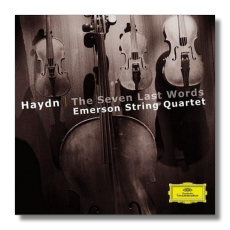
The Internet's Premier Classical Music Source
Related Links
- F.J. Haydn Reviews
- Latest Reviews
- More Reviews
-
By Composer
-
Collections
DVD & Blu-ray
Books
Concert Reviews
Articles/Interviews
Software
Audio
Search Amazon
Recommended Links
Site News
 CD Review
CD Review
Franz Joseph Haydn

The Seven Last Words of our Savior on the Cross, Op. 51
Emerson String Quartet
Deutsche Grammophon 474836-2 69:03 DDD
The Seven Last Words exists in several versions. Haydn began with an orchestral work, and about a decade later composed a version for chorus. In addition to the version for string quartet, there is one for solo piano as well, whose preparation he merely supervised.
Now here's where things get really interesting. When preparing the choral version, Haydn added a brief but impressive interlude for woodwinds between the fourth and fifth "words." Because the version for string quartet predates the composer's choral version, this interlude is not played by string quartets. The Emersons, however, decided that the interlude's expressive power outweighed concerns about authenticity and "interrupting the narrative flow of the Passion story," so they transcribed it for string quartet, and it is included here.
The Emersons have made other changes as well. Citing the possibility that Haydn was not entirely responsible for arranging The Seven Last Words for string quartet, the Emersons point out odd deficiencies in this arrangement, namely the loss of important motivic material that was present in the original version. In some cases, it is almost as if the person(s) responsible transcribed the accompaniment but not the melody! By reallocating parts, the Emersons have been able to add this material back. This amounts to no more than a handful of bars here and there, however, so purists should not get overly alarmed.
The care taken in deciding how The Seven Last Words was to be performed is reflected in the quality of the recorded performance itself. This is a reading that nicely balances the work's religious importance and emotional content with the understanding that this is music solidly located within the Classical tradition. The Emersons do not corrupt Haydn's music in the interests in expressivity; instead, they find expressivity within the bounds of what was reasonable in 1785 – the year in which the original work was written. This, above all, is a dignified reading, but no less grieving for all that.
My copy of this CD came with several pages missing from the booklet; perhaps you will be more lucky! The recording was made in the American Academy of Arts and Letters in New York City in the fall of 2002.
Copyright © 2004, Raymond Tuttle


















